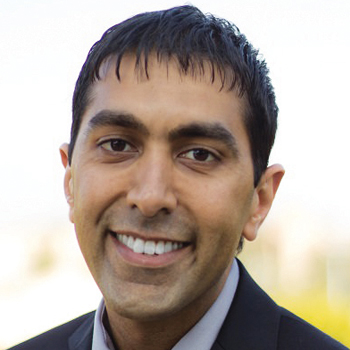Garg made organic chemistry one of UCLA’s most popular classes
is a chemistry professor with a mission to change the way organic chemistry is taught. For his classroom innovations, he has won the 2019 ͵��͵�� and ͵��͵�� Biology Award for Exemplary Contributions to Education.

“It is a tremendous honor to receive the ASBMB Award for Exemplary Contributions to Education.Organic chemistry has been viewed as a weed-out class for decades, but at UCLA, we are challenging our students to overcome such preconceived notions.We want our students to appreciate how organic chemistry relates to biology and modern medicine.We also use the class as a vehicle for students to learn impeccable problem solving skills that will benefit them in all of their future endeavors.”
— Neil Garg
Organic chemistry is not a class that people typically think of as being fun. But Garg’s Chemistry 14D: Organic Reactions and Pharmaceuticals is a popular course at the University of California, Los Angeles. Garg describes real-life applications in his classes, and students say that he makes a personal connection with every one of his nearly 400 individuals in the classroom, according to on the UCLA Newsroom website.
, a professor and chair of chemistry and biochemistry at UCLA, nominated Garg for the award, explaining that he has succeeded with Chem 14D because he can explain concepts clearly and teach problem-solving skills. He also is able to integrate established and innovative teaching methods — for example, with an assignment in which students can produce chemistry music videos.
“Simply put, Neil has been an amazing teacher and his impact on chemical and biochemical education has been transformative,” Clarke wrote in her nomination letter.
Garg earned his undergraduate degree in chemistry from New York University and a Ph.D. from the California Institute of Technology, where, in Brian Stoltz’s lab, he synthesized several dragmacidin alkaloids possessing anti-viral and anti-cancer activities. He did postdoctoral work in Larry Overman’s lab at the University of California, Irvine, where he completed the total synthesis of the bioactive alkaloid sarain A.
Since joining the UCLA faculty in 2007, Garg has helped develop many educational tools to help students, including an app called Backside Attack, an online tool called QR Chem and an online tutorial, BACON, short for Biology and Chemistry Online Notes. He also wrote and self-published an organic chemistry coloring book for children.
Justin Bañaga, who took Garg’s classes as an undergraduate, supported the award nomination with a letter. “Dr. Garg has a unique teaching style that sets him apart from other professors,” Bañaga wrote. “He inspires and captivates his students with his highly entertaining and enjoyable lectures and devises ingenious methods of combining fun facts with notable information to help his students learn the depth and immense amount of material that he covers.”
In another letter of nomination, , a chemistry professor at the California Institute of Technology, wrote, “Garg has also done amazing things in undergraduate education and is clearly one of the best university educators in the country.”
Garg has won numerous honors, including UCLA’s Harvey L. Eby Award for the Art of Teaching. He also competed for and won the Robert Foster Cherry Award, which is the largest university teaching prize and spans all fields of academia.
Garg will receive his award during the ASBMB annual meeting at the Experimental Biology 2019 conference in Orlando, where he will deliver an award lecture titled “How organic chemistry became one of UCLA’s most popular classes” at 3 p.m. April 7 in Valencia Ballroom A at the Orange County Convention Center.
Enjoy reading ASBMB Today?
Become a member to receive the print edition four times a year and the digital edition weekly.
Learn moreGet the latest from ASBMB Today
Enter your email address, and we’ll send you a weekly email with recent articles, interviews and more.
Latest in People
People highlights or most popular articles

Transforming learning through innovation and collaboration
Neena Grover will receive the William C. Rose Award for Exemplary Contributions to Education at the 2025 ASBMB Annual Meeting, April 12–15 in Chicago.

Guiding grocery carts to shape healthy habits
Robert “Nate” Helsley will receive the Walter A. Shaw Young Investigator in Lipid Research Award at the 2025 ASBMB Annual Meeting, April 12–15 in Chicago.

Leading the charge for gender equity
Nicole Woitowich will receive the ASBMB Emerging Leadership Award at the 2025 ASBMB Annual meeting, April 12–15 in Chicago.

Honors for de la Fuente, Mittag and De La Cruz
César de la Fuente receives the American Society of Microbiology’s Award for Early Career Basic Research. Tanja Mittag and Enrique M. De La Cruz are named fellows by the Biophysical Society.

In memoriam: Horst Schulz
He was a professor emeritus at City College of New York and at the CUNY Graduate Center in Manhattan whose work concentrated on increasing our understanding of mitochondrial fatty acid metabolism and an ASBMB member since 1971.

Computational and biophysical approaches to disordered proteins
Rohit Pappu will receive the 2025 DeLano Award for Computational Biosciences at the ASBMB Annual Meeting, April 12-15 in Chicago.

